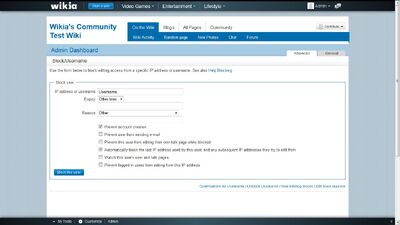Welcome to another installment of wiki advice. This time, one for admins: an overview of blocking.
How to block[]
First, a quick refresher on how to block.

The block page. Be sure to look at all the options here
The easiest way to block someone is via their contributions page. Go to their profile, and click the "contributions" tab. If you are an admin, you will see useful links the contributions page, including a link to the block page.
This will take you to the block page, with the username or IP already filled in. There you can choose the duration of the block, and the text that the user sees when they try to edit.
You can also select various options for the block. In general, it's best not to check "Prevent this user from editing their own talk page while blocked". Leaving the talk page open gives the user a way to communicate with you about their block, which can help in resolving the problem. For logged in user, it's usually best to check "Prevent account creation". This won't prevent all account creation, but might slow them down a little. It's also generally best to check "Automatically block the last IP..." for logged in users. Again, this isn't a perfect fix, but it can help make blocks effective. And for logged out users, you should usually check "Prevent logged-in users...", this will mean the ban stays in effect if they make an account and stay on the same IP.
There's more on how to block at Help:Blocking
Why block?[]
It could be said that there is only one good reason to block - to prevent damage to the wiki. Of course, there are lots of ways to cause damage, so many reasons within that to block.
The most obvious reason to block is simple vandalism. That's when someone edits your articles or other pages with nonsense or false information. There's various reasons people do this, including simply not understanding what a wiki is and how it works. At the other end of the scale, there is malicious vandalism. This could be out of anger, dislike of the topic of the article, or just trolling. Either way, the first reaction is the same: to stop the person causing more damage, you need to block. That also gives you time to work out what else you need to do - whether that is contacting the person to find out if they are confused, or not feeding the trolls)
It might also be necessary to block someone who is upset and not being reasonable. A "time-out" or enforced break can be a useful tool in a situation where someone is overwrought. Of course, a better way to deal with this is to talk to the person, understand their issues, and solve the problems - but sometimes it's just not possible to do that and a break is better.
Another valid reason to block is if someone isn't following the wiki's rules, and is refusing to change that. It's important to start by talking to them and trying to understand why they are breaking the rules, but at some point it can be necessary to block to enforce the rules. But please think carefully about whether your rules are right! That's important when someone disagrees with you.
Remember, it's up to each wiki to decide what their rules are (as long as they are within the Terms of Use). In theory, a wiki could have a rule that everyone whose name begins with "S" will be blocked - but that is unlikely to be a successful wiki! Fair and sensible rules will lead to a stronger and more stable community. It's also possible to have a wiki without lots of written rules, with Admins deciding when to block without written guidelines. There's no one way to run a community, but if you run it with cooperation, mutual respect, and care for the good of the community, it will lead to a strong and happy wiki.
Another reason to block is to get someone's attention. Someone who is new to the site may not notice they have message wall posts or talk page messages, it's easy to get focused on one part of the site and miss the notifications. If they are making mistakes and not responding to messages, you may need to give them a short block. Not being able to complete their edit will draw their attention to the text of the message block, which can point them to their message wall or talk page.
When not to block[]
Each community is different, but there are some general guidelines on when it's best not to block.
Firstly, it's a bad idea to block in anger. It's easy to get heated when there's an argument on a wiki, but it's not good to allow that anger to determine whether you block someone or not. If in doubt, it's good to get a second opinion from an uninvolved admin. Or just take a break before deciding - if there's no active vandalism going on, then most blocks can wait a little while until you calm down.
Another type of block that is generally a bad idea, is joke blocks. Some humor wikis use these, and it's understandable in the context of those wikis. But even there, I would recommend against them. They can be very disruptive, and make real blocks more ambiguous. It's better to keep blocks businesslike and leave the jokes for elsewhere.
It's also bad to block because you simply don't like someone. Personal differences often happen on wikis, and the strongest wikis work though that. A wiki that's run with "the in-crowd" with anyone outside that being blocked, is not a healthy wiki.
Some other tips[]
My biggest recommendation would be to use infinite blocks sparingly. Most people's IPs change regularly, and the chances are that someone affected by an IP block in a years time won't be the same person you blocked! For IPs, we recommend blocking for no more than 3 months. Remember, you can always block again in a few months (and for longer) in the rare case that there are more problems from that IP.
It's similar with logged in users. It's best to start with a short block, and only increase it if needed. Someone may have changed significantly after a few months, and may have something to offer the wiki. I've seen that happen, and believe in giving people a second chance where possible.
Another suggestion is to always try to give a warning, and to talk to the person about problems before blocking. You don't need to stop and talk to a vandal before you block, there you need to block quickly to stop the damage! And other urgent situations may mean you need to block without warning. But in a more slow-moving situations, a warning is generally a good idea.
And finally, remember the aim of blocking. The goal is to prevent or reduce damage to the wiki. So it's important to consider whether that's really the motivation for your block... and if not, how else you can fix the problem. Blocks are a very necessary tool on wikis, but a power to be used responsibly.
Click here to follow the Fandom staff blog.
Click here to sign up for the From the Desk of Community email newsletter.
Join our Official Discord server for registered editors!


